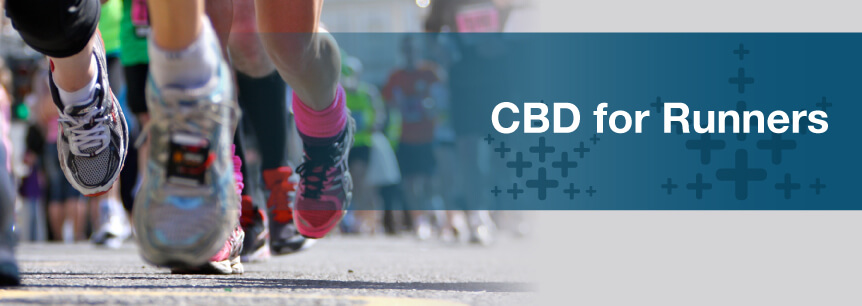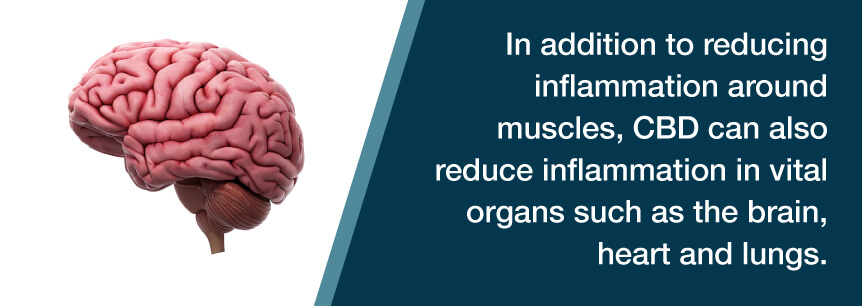
Runners, like many other athletes, frequently push themselves to their limits just to get that endorphin boost. While there are many physical and mental benefits of running, the intensity of it can strain various muscle groups over time. Whether you’re a recreational runner or if you’re training for a race or a marathon, CBD may help alleviate soreness and assist with recovery during training.
CBD, or cannabidiol, is one of the many cannabinoids found in marijuana. Preliminary research has found that CBD can reduce physical pain and inflammation for people with chronic pain and similar conditions, and there are still a growing number of small studies working to further the research on the effects and benefits of CBD.
Here are 10 ways runners can use CBD products to help them run better and prevent them from strain and injury.
Medical cannabis is increasingly popular for people with chronic pain. Similarly, CBD can be helpful for runners in alleviating pain, but unlike THC, it doesn’t have the same psychoactive characteristics to produce a “high”. Runners may find relief with CBD immediately after a run or in the following days if soreness persists.
The reason why cannabinoids like CBD work naturally with the body is because they interact with the body’s natural endocannabinoid system such as its endocannabinoid receptors. CBD has been efficacious in treating neuropathic pain such as multiple sclerosis.
Runners can face inflammation for a variety of reasons. After going for a run, white blood cells replenish bio-chemicals to your legs, to relieve them from over-exhaustion. During this time, your legs can swell up because muscle tissue is expanding. While swelling is a normal and healthy reaction post-running, it can still be painful and uncomfortable.
Two ways to use CBD after a run is to apply a topical cream to sore or tense spots, or take CBD oil, which also works as an anti-inflammatory agent. Using CBD topical cream or CBD oil can prevent joint injury while runners train and can also reduce swelling and pain associated with sprains.
Some cannabinoids in cannabis have a sedative effect on users. One of the strongest cannabinoids is cannabinol (CBN). CBN binds to CB2 receptors in the body, which can have a pain-relieving effect, but also work well as a sleep-aid. CBN, unlike THC, and similarly to CBD, doesn’t have psychoactive effects, so it will not get you “high”.
Look for CBD products with higher quantities of CBN to have a deeper night’s sleep. Studies show that athletes who get a better quality of sleep often experience better muscle recovery and faster muscle growth.
After training hard for many hours, athletes can experience nausea, dizziness, or even a loss of appetite. Cannabis has been found to have anti-emetic effects that prevent nausea. This is because in the digestive tract, there is evidence of the presence of high levels of endocannabinoids, which cannabinoids like CBD can interact with.
Runners are more likely to prefer to use topical lotions and tinctures to avoid any irritation and harshness on their lungs from inhaling cannabis.
Athletes can experience muscle spasms and cramps due to repeated use of the same muscle groups. Muscle spasms are contractions that take place sporadically without control and can be temporary or even chronic.
The body’s inflammatory response to cramps and muscle spasms can further aggravate surrounding tissue and muscles, which is why it’s better to treat cramps and spasms when and as they occur.
CBD topicals work on virtually all muscle groups including the neck, arms, glutes, legs and on your back. By massaging the topical onto the targeted area, it can reduce inflammation on strained or injured muscles.
Cannabis is a well-known appetite booster because it helps raise the levels of various hormones in the blood, such as leptin and ghrelin, which can boost energy levels and induce hunger.
The endocannabinoid system has been linked to monitoring appetite, metabolic health, blood sugar regulation, and obesity. Incorporating CBD into your routine might not ultimately change your diet, but it can help runners regulate the types of foods and quantities they consume.
This can be good for athletes and runners who burn a lot of calories during their work-outs and need to replenish themselves through a high-calorie diet. It can also encourage runners who don’t naturally have high-calorie diets to eat more so that they can gain the stamina and endurance for long-distance races.
In addition to reducing inflammation around muscles, CBD can also reduce inflammation in vital organs such as the brain, heart and lungs. In the case of a fall or worse, a concussion, CBD may play a role in alleviating headaches because of its anti-inflammatory properties and neuroprotective effects. Little is still known about the role of cannabis in treating concussions and post-concussion syndrome.

Some athletes and runners might resort to over-the-counter pain medications like Ibuprofen or Methadone in dire cases. Such painkillers may provide temporary relief from pain, but they have no impact on the time it takes to recover.
CBD, unlike other pain medications, is not addictive and can be used in various doses and on a daily basis without having longterm effects and risks.
The immune system is a huge network made up of many different receptors that functions to provide immunity against pathogens and other foreign bodies.
During the weeks before a race or marathon, most athletes go through intense training and periods where their bodies are fatigued and shocked. Practicing harder in a short duration of time can have side effects on the body like weakening the immune system.
Marathons and races can create anxiety for new runners or experienced athletes. CBD products that are low in THC are widely known to reduce this anxiety and give overall mental health benefits, not just physical ones.
No Information on MarijuanaDoctors.Com should be used to diagnose, treat, prevent or cure any disease or condition. You can view our Full Disclaimer here.